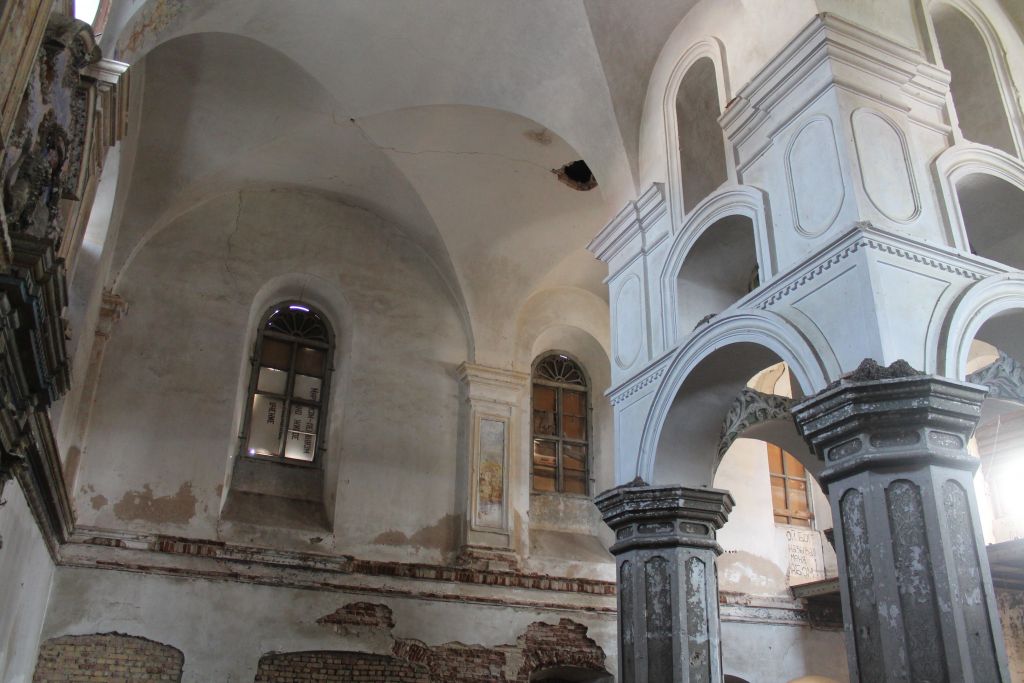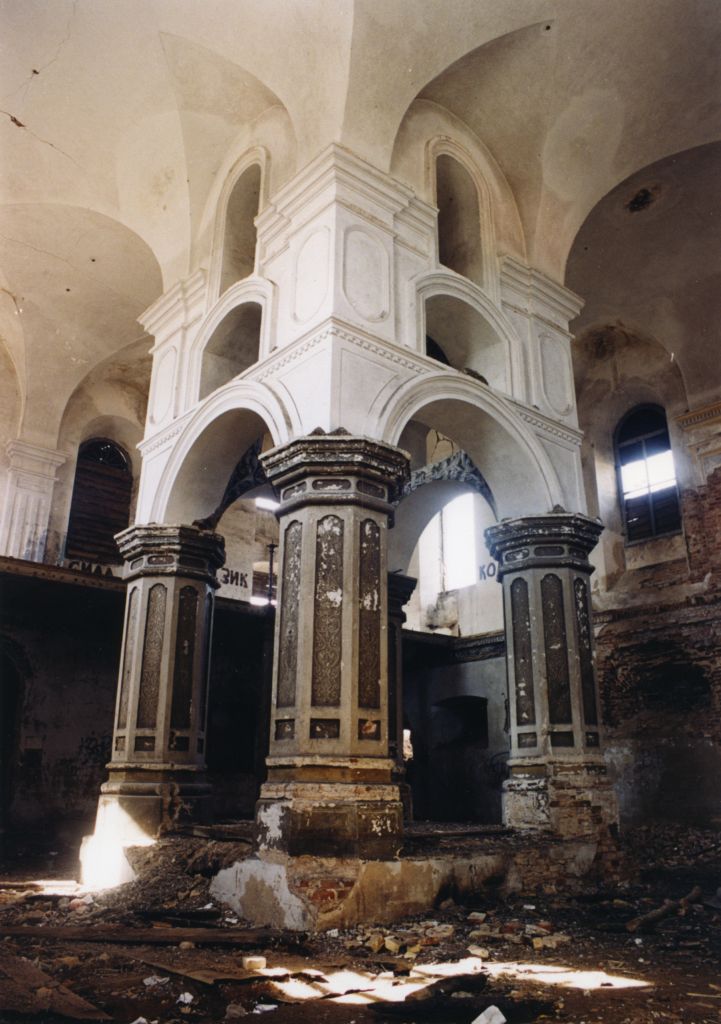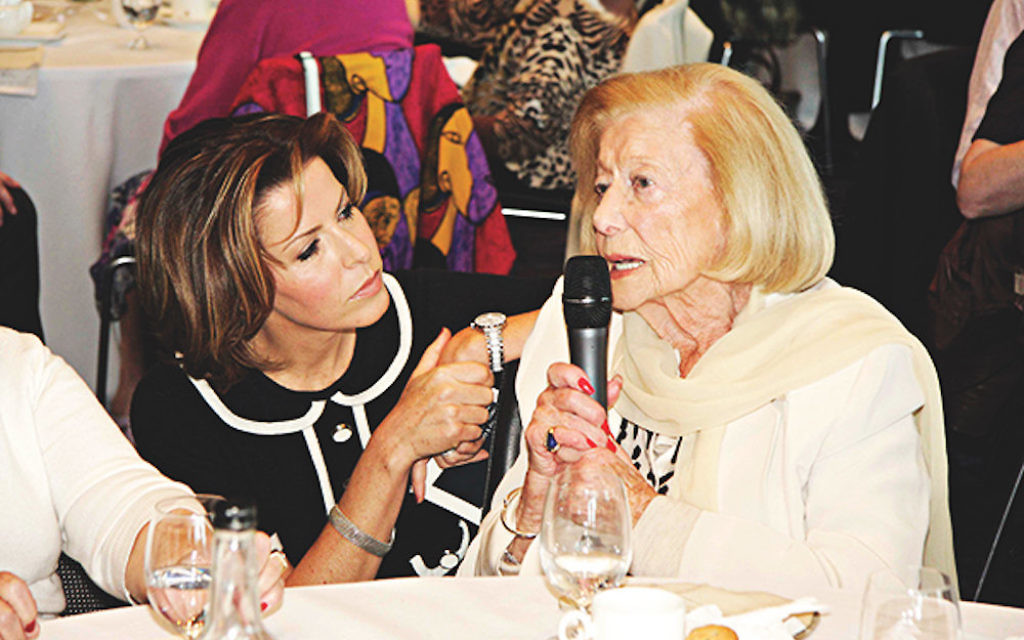OPINION – Natasha Kaplinsky: Help me save crumbling last witness to history
Renowned British broadcaster reflects on work with The Foundation for Jewish Heritage to try to help preserve the Great Synagogue of Slonim
Prior to the Second World War, there were some 17,000 synagogues in Europe. Today, a little more than 3,300 of those remain, with 750 in poor or very bad condition, some on the verge of collapse.
These statistics only came to my attention in recent months. However, one synagogue among those most ‘at risk’ made its mark on me 10 years ago, for very personal reasons.
In 2007, as part of the programme I made with the BBC, Who Do You Think You Are?, I visited Slonim in Belarus to find out more about my ancestry. While there, I discovered that a number of my relatives on my father’s side had perished in the Holocaust.
Get The Jewish News Daily Edition by email and never miss our top stories Free Sign Up
The Great Synagogue in Slonim was one of the synagogues where they would have worshipped – and on that same visit I stood inside its crumbling walls as my father’s cousin recited Kaddish for our lost family.
Ten years on, this beautiful synagogue is even more run down, vandalised and structurally in danger.

As the last testament to the estimated 17,000-strong Jewish community that had lived there for centuries up to the Second World War, it feels very important to me that it is restored and preserved for future generations.
This is why I support the work of the Foundation for Jewish Heritage, which is working on precisely that.
It is not just about saving architecturally beautiful and significant buildings – important as that is. It is about saving the last physical evidence of once vibrant communities.
These buildings should serve as portals to history, educating future generations about the Jewish life and their contribution to wider society, as well as the diversity of communities that once existed.

With Slonim, and with the other synagogues highlighted by this project, the vision is for these buildings to incorporate Jewish museums, educational facilities and cultural centres.
In the same way as my work with Holocaust commemoration was motivated by the need to create a record for future generations to learn from, the Foundation for Jewish Heritage’s programme is not just about acts of preservation. It is about increasing understanding, knowledge and empathy so we can combat the growing intolerance in the world today and the dangers of what that can lead to.

A couple of years ago, my extended family and I returned to Slonim, 27 of us in all. We visited various places of significance to our family who had lived in the town, including the synagogue. There were hoardings around the building and we had to find a gap to enter but, once inside, we all felt the impact of this imposing building, which was part of our family’s roots.
However, it was in very poor condition and we understand that its beautiful ceiling may not survive another winter. I know we were all struck at the time by a feeling that we had to do something to preserve it and memorialise its community.
On our return, we discovered the Foundation for Jewish Heritage had already begun a project to map the historic synagogues in Europe – and that Slonim was among those deemed a priority.
While Slonim Synagogue has a special significance for my family, we are just one example among so many others whose history is tied to lost Jewish communities throughout Europe. Some of these communities migrated to other areas, but in many cases they disappeared as a result of the terrible events of the 20th century.
These buildings are the last witnesses to their existence. Let’s save them before it is too late.
- Natasha Kaplinsky is a TV presenter and newsreader who has worked for BBC, ITV and Sky. Last year, she was awarded an OBE for services to Holocaust commemoration.
- The Kaplinsky family are working with The Foundation for Jewish Heritage to try to help preserve The Great Synagogue of Slonim

Thank you for helping to make Jewish News the leading source of news and opinion for the UK Jewish community. Today we're asking for your invaluable help to continue putting our community first in everything we do.
For as little as £5 a month you can help sustain the vital work we do in celebrating and standing up for Jewish life in Britain.
Jewish News holds our community together and keeps us connected. Like a synagogue, it’s where people turn to feel part of something bigger. It also proudly shows the rest of Britain the vibrancy and rich culture of modern Jewish life.
You can make a quick and easy one-off or monthly contribution of £5, £10, £20 or any other sum you’re comfortable with.
100% of your donation will help us continue celebrating our community, in all its dynamic diversity...
Engaging
Being a community platform means so much more than producing a newspaper and website. One of our proudest roles is media partnering with our invaluable charities to amplify the outstanding work they do to help us all.
Celebrating
There’s no shortage of oys in the world but Jewish News takes every opportunity to celebrate the joys too, through projects like Night of Heroes, 40 Under 40 and other compelling countdowns that make the community kvell with pride.
Pioneering
In the first collaboration between media outlets from different faiths, Jewish News worked with British Muslim TV and Church Times to produce a list of young activists leading the way on interfaith understanding.
Campaigning
Royal Mail issued a stamp honouring Holocaust hero Sir Nicholas Winton after a Jewish News campaign attracted more than 100,000 backers. Jewish Newsalso produces special editions of the paper highlighting pressing issues including mental health and Holocaust remembrance.
Easy access
In an age when news is readily accessible, Jewish News provides high-quality content free online and offline, removing any financial barriers to connecting people.
Voice of our community to wider society
The Jewish News team regularly appears on TV, radio and on the pages of the national press to comment on stories about the Jewish community. Easy access to the paper on the streets of London also means Jewish News provides an invaluable window into the community for the country at large.
We hope you agree all this is worth preserving.
-
By Laurent Vaughan - Senior Associate (Bishop & Sewell Solicitors)
-
By Laurent Vaughan - Senior Associate (Bishop & Sewell Solicitors)
-
By Laurent Vaughan - Senior Associate (Bishop & Sewell Solicitors)
-
By Laurent Vaughan - Senior Associate (Bishop & Sewell Solicitors)






















